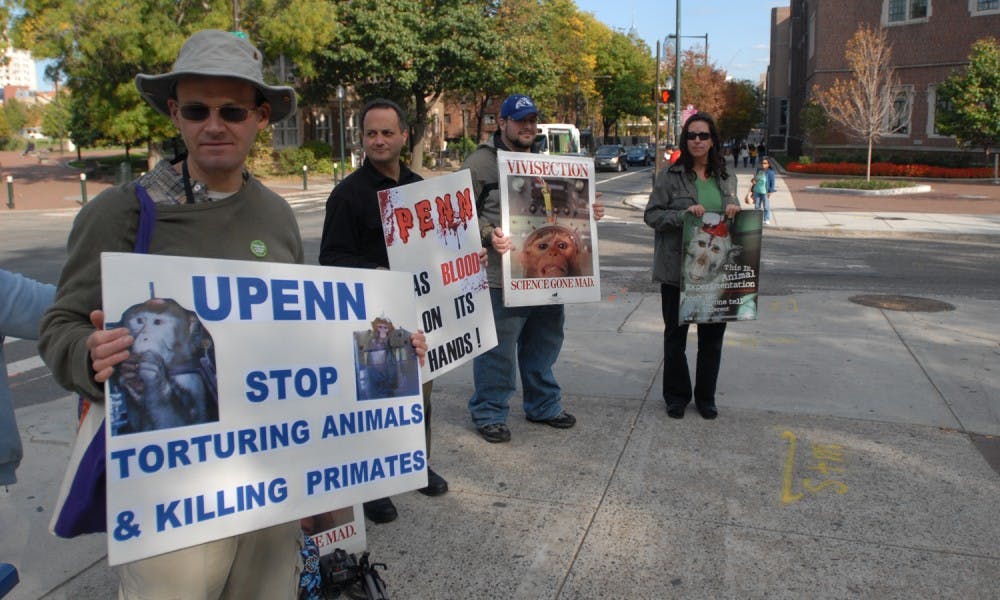
University’s behavior “negligence which could easily have been avoided.”
On Dec. 29, 2014, Budkie filed an official complaint to the USDA against the University. In the complaint, he wrote, “University of Pennsylvania has a long history of animal abuse which has led to multiple animal deaths, I must insist that you take the most severe action allowable under the Animal Welfare Act.”
SAEN is calling for the USDA to fine Penn the maximum amount of $10,000 per animal — totaling in this case to $60,000. However, Budkie said that even this penalty would not be sufficient because labs frequently view fines as a cost of doing business. Since universities make millions of dollars a year on animal rights research, Budkie believes that they have little incentive to improve compliance.
“As far as the Animal Welfare Act goes, that fine is all the USDA can do. There is no such thing as a criminal penalty. The USDA has no authority to close a laboratory,” Budkie said.
Whether Penn will actually be fined for the six violations in 2014 is unclear. Budkie said that the USDA tends to “issue something on the order of five to 10 fines nationally per year.”
Still, he is optimistic. “Since the University of Pennsylvania recently received an official warning, I would say the chances are better than usual,” he said.
Espinosa confirmed that the USDA is looking into the six reported violations.
As far as peer institutions go, Harvard was fined $24,000 in December of 2013 for 11 violations of the Animal Welfare Act.
Penn’s Vice Provost for Research Dawn Bonnell, whose signature appears on official documentation of the monkey and pig injuries, was unavailable to comment on this story.
“It is extremely important to note that the University of Pennsylvania faculty themselves reported these incidents to the Office of Animal Welfare,” Institutional Animal Care and Use committee chair Yale Cohen said in an email. “All appropriate steps by the Office of Animal Welfare were taken to correct these issues and to ensure that these unfortunate incidents cannot occur in the future.”
According to Cohen, outside of the six violations reported to the National Institute of Health, there were no additional issues with animal research in 2014.
“It is important to understand that SAEN’s goal is to advance its agenda of eliminating all biomedical research using animals,” Cohen said.
Penn Vegan Society co-President Brianna Krejci said the organization believes in maintaining the integrity of life, but supports animal research.
“Penn Vegan’s Society’s official stance is that we recognize what the benefits that can come of animal research are and that have come, especially at a large research university,” she said.
After reviewing the specific documents related to SAEN’s complaint, Krejci said she places the onus on specific researchers who made mistakes. “The problem comes in when individuals don’t know the procedures,” she said.
The University handled the incident to her satisfaction. “[The injuries] were a thing that happened and then they were mediated and policies were put in place to ensure that doesn’t happen again,” she said. Following the injuries in 2014, the University reported several ways they would avoid injuries like these in the future, like using a water blanket to avoid burning primates and improving experiment preparation procedures.
Krejci speculated that Penn may receive increased attention from animal rights watchdogs because it has a history of animal abuse. Most notable, she said, were incidents that occurred in Penn’s head injury clinic in the early ‘80s. A 1984 PETA film Unnecessary Fuss showed footage of the Penn researchers laughing at baboons while inflicting brain damage.
Those revelations led to major reforms in research at Penn, including the firing of a chief veterinarian, a lab closure and withdrawal of funds. As recently as 2011, the Penn Vegan Society appealed to the University Council about an incident involving a puppy that allegedly slipped through a grate where it was found dead, Krejci said. That year, the Physicians Committee for Responsible Medicine, a Washington D.C. based nonprofit, ranked Penn as having the greatest number of violations in the Ivy League.
Krejci said her focus is not on abolishing animal research. “We are not societally and technologically at a place where we can get rid of animal testing completely,” she said. “The benefits completely outweigh the animals that are dying.”
The Daily Pennsylvanian is an independent, student-run newspaper. Please consider making a donation to support the coverage that shapes the University. Your generosity ensures a future of strong journalism at Penn.
DonatePlease note All comments are eligible for publication in The Daily Pennsylvanian.







